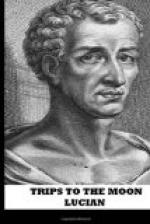{147b} Which the reader will remember was given him by way of charm, on his departure from the Happy Island.
{148} Gr. [Greek], asini-eruras, ass-legged.
{149} The ensuing books never appeared. The “True History,” like
—“the
bear and fiddle,
Begins, but breaks off
in the middle.”
D’Ablancourt, as I observed above, has carried it on a little farther. There is still room for any ingenious modern to take the plan from Lucian, and improve upon it.
{153} The ancient Greek stadium is supposed to have contained a hundred and twenty-five geometrical paces, or six hundred and twenty-five Roman feet, corresponding to our furlong. Eight stadia make a geometrical, or Italian mile; and twenty, according to Dacier, a French league. It is observed, notwithstanding, by Guilletiere, a famous French writer, that the stadium was only six hundred Athenian feet, six hundred and four English feet, or a hundred and three geometrical paces.
The Greeks measured all their distances by stadia, which, after all we can discover concerning them, are different in different times and places.
{154} The Phoenicians, it is supposed, were the first sailors, and steered their course according to the appearance of the stars.
{155} Greek, [Greek], coelicoloe, Homer’s general name for the gods.
{156} Ganymede, whom Jupiter fell in love with, as he was hunting on Mount Ida, and turning himself into an eagle, carried up with him to heaven. “I am sure,” says Menippus’s friend, archly enough, “you were not carried up there, like Ganymede, for your beauty.”
{157a} “Icarus Icariis nomina fecit aquis.” The story is too well known to stand in need of any illustration. This accounts for the title of Icaro-Menippus.
{157b} See Bishop Wilkins’s “Art of Flying,” where this ingenious contrivance of Menippus’s is greatly improved upon. For a humorous detail of the many advantages attending this noble art, I refer my readers to the Spectator.
{159} Even Lucian’s Menippus, we see, could not reflect on the works of God without admiration; but with how much more dignity are they considered by the holy Psalmist!—
“O praise the Lord of heaven, praise Him in the height. Praise Him, sun and moon; praise Him, all ye stars; praise the Lord upon earth, ye dragons and all deeps; fire and hail, snow and vapours, wind and storm fulfilling His word.”—Psalm cxlviii.
{161} This was the opinion of Anaxagoras, one of the Ionic philosophers, born at Clazomene, in the first year of the seventieth Olympiad. See Plutarch and Diogenes Laert.
{162} Alluding to the doctrines of Plato and Aristotle.
{163a} This was the opinion of Democritus, who held that there were infinite worlds in infinite space, according to all circumstances, some of which are not only like to one another, but every way so perfectly and absolutely equal, that there is no difference betwixt them. See Plutarch, and Tully, Quest. Acad.




